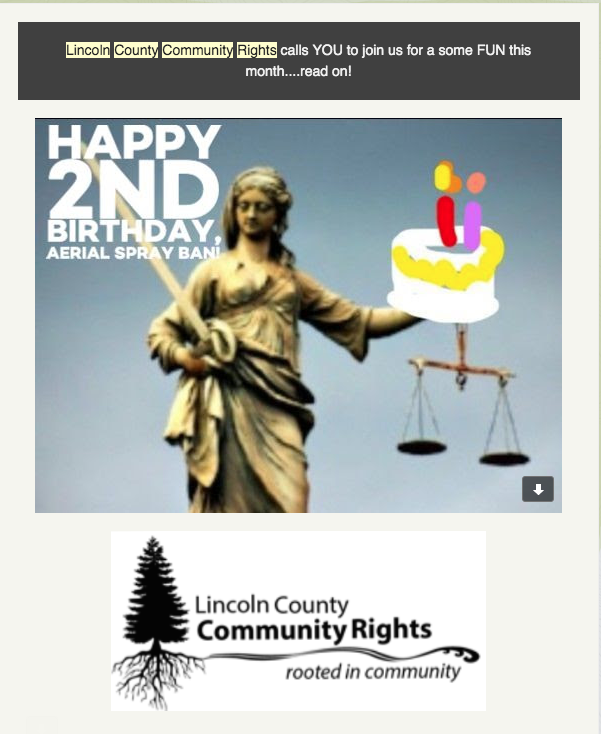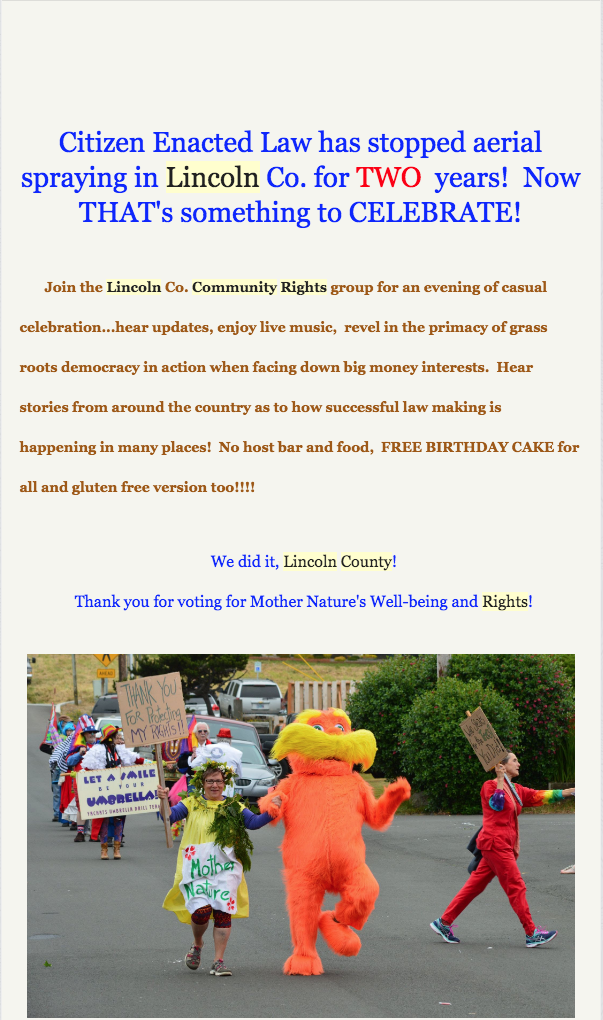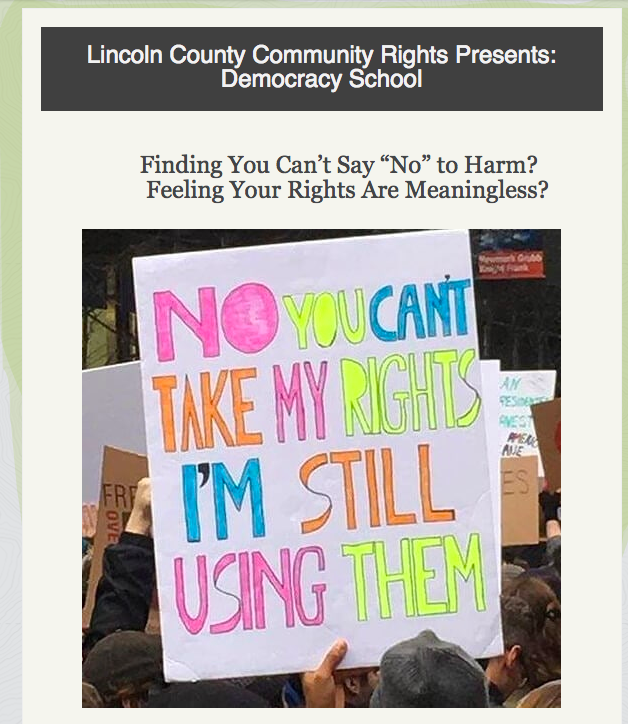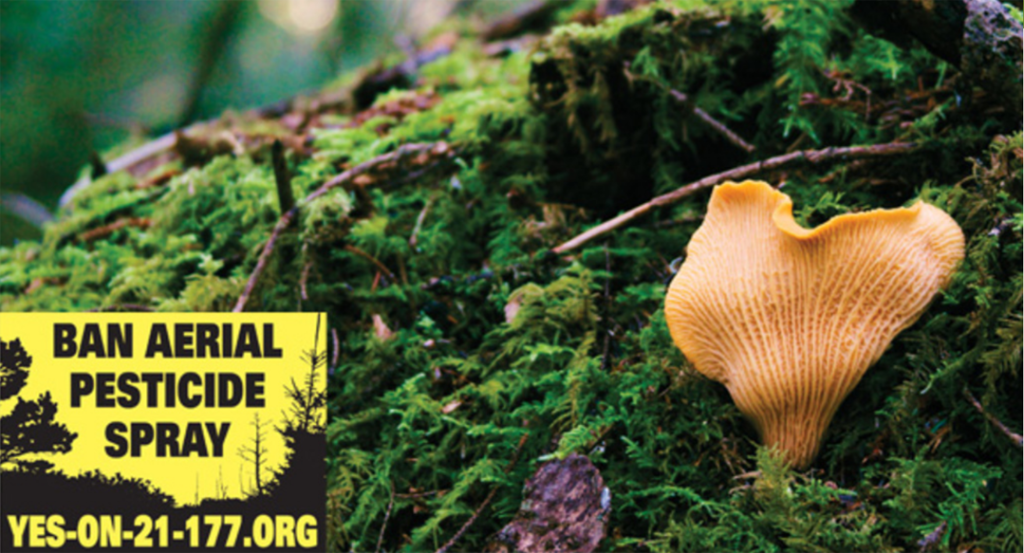


Author Archives: admin
Democracy School April 5th and 6th



Lincoln County will have to wait for a decision on the legality of Measure 21-177
Kboo Radio Story around the Court Hearing on OCT. 9th

Lincoln County will have to wait for a decision on the legality of Measure 21-177
October 11, 2017
Contact:
Media Contacts
Maria Sause Rio Davidson
mkrausster@gmail.com riodavidson@gmail.com
541 574 2961; cell 541 961 6385 cell 541 961 5606
Newport, Oregon: On Monday, October 9th, Judge Sheryl Bachart heard from the parties in the lawsuit Rex Capri and Wakefield Farms, LLC vs. Dana W. Jenkins and Lincoln County, and intervenor-defendants Lincoln County Community Rights. The lawsuit was filed in response to the ban on aerial pesticide spraying imposed by the vote of the people on May 16, 2017. During yesterday’s hearing, and after delivering their arguments, the parties asked for a Summary Judgment from Judge Backart in a courtroom packed by attending public.
Lincoln County Community Rights, Intervenor-defendants, held a rally at the intersection of Highway 101 and Highway 20. LCCR was supported by a crowd of over 30 people, who waved signs at passing vehicles calling out the issues that motivated Measure 21-177, among them the harm done by aerial pesticide spraying to people and ecosystems, the injustice of laws drafted by corporations for approval by our legislature which make it illegal for the people to protect their health and safety more stringently than the state’s regulations allow. This is known as State preemption. “Preemption laws are emblematic of the “top-down” hierarchical, authoritarian control preferred by corporations. Rather than have to contend with thousands of town and counties, the corporations need only seduce state and federal legislators who are always on the prowl for campaign cash,” said LCCR member John Colman-Pinning. LCCR members also called for better protection of our ecosystems and for recognition of the Rights of Nature. Honking horns saluted the sign waivers.
Attorney for Plaintiffs, Gregory A. Chaimov, argued for full annulment of Measure 21-177, on the grounds that it is preempted by state legislation, which declares that pesticide regulation is the exclusive province of the state and are more powerful than the right of the people to make law that advances greater protections for health and safety.
Lincoln County, represented by County Counsel Wayne Belmont, although defending only a small portion of the ban on aerial pesticide spraying as applying to county property and to land located within urban growth boundaries, did say that the people’s right to bring new law forward through the initiative process needs to be protected. In his argument, Wayne Belmont favored salvaging portions of Measure 21-177 and asked for advice from the judge in doing that. The judge can comment on the ordinance, but cannot add language to it or subtract language from it.
Attorney for Intervenor-Defendants Lincoln County Community Rights, Ann Kneeland, raised the argument to the high moral ground where it belongs by bringing in the language of the Declaration of Independence (recognized as an organic law of the United States and part of the United States Code), and of Section 1, Article 1 of the Constitution of the State of Oregon. Both documents refer to the people’s inherent right to local community self-government in matters that pertain to their fundamental rights, listed in each. They also refer to the government power that is inherent to the people, and to their right to change that government when it fails to protect their fundamental rights. She also referred to the power to influence legislation which corporations have acquired through the Supreme Court ruling that “money is speech”, exposing where our government is failing us by allowing our legislatures to be influenced by the profit interests of corporations, although there is no law that states that they can do this.
Judge Bachart did not issue a final ruling on the lawsuit questioning the legality of Measure 21-177 and will take the time she needs to review all arguments and reach her decision. That time may or may not come until the beginning of next year. To see all of the filed court documents please visit www.lincolncountycommunityrights.org/court-documents.
ABOUT LINCOLN COUNTY COMMUNITY RIGHTS
Lincoln County Community Rights is a public benefit organization that seeks to educate and empower people to exercise their right of local community self-government in matters that pertain to their fundamental rights, their natural environment, their quality of life, their health and their safety. Given the harms that people and ecosystems suffer from the practice of aerial spraying of industrial forest land with pesticides, the group drafted an ordinance to ban aerial pesticide spraying in Lincoln County, Oregon. Measure 21-177 was adopted by voters in May 2017, making Lincoln County the first county in the United States to ban aerial pesticide spraying through the vote of the people. www.lincolncountycommunityrights.org
Today in Lincoln County Court Hearing on October 9th to look at Lincoln County’s measure 21-177 a ban on aerial spraying of pesticides
Today in Lincoln County Court
Hearing on October 9th to look at Lincoln County’s measure 21-177 a ban on aerial spraying of pesticides
October 9, 2017
FOR IMMEDIATE RELEASE
Contact:
Maria Sause
mkrausster@gmail.com
541.574.2981 541.961.6385
Rio Davidson
riodavidson@gmail.com
541.9615606
Newport, Oregon: On the morning of October 9th, Judge Sheryl Bachart will hear from parties in the lawsuit Rex Capri and Wakefield Farms, LLC vs. Dana W. Jenkins and Lincoln County, and intervenor-defendants Lincoln County Community Rights. The lawsuit was filed in response to the people’s affirmative vote to ban aerial spraying of pesticides in Lincoln County on May 16, 2017. The ballot measure, Measure 21-177, has been law in Lincoln County since early June, and no documented aerial spraying has occurred since then.
In their original complaint and associated briefs, plaintiffs Rex Capri of Newport and Wakefield Farms LLC of Eddyville claim that the county’s ban on aerial spraying of pesticides is overridden by state preemption laws. If that claim is upheld, it would mean that the authority of corporations to engage in aerial pesticide spraying for profit is held to be superior to the right of the people of Lincoln County to ban such spraying due to its documented harms to public health and the environment.
The most recent evidence of the toxic effect of pesticides came to light a month or so ago when it finally became possible to release an extensive collection of documents, now referred to as the Poison Papers (www.poisonpapers.org). The documents had been stored for several decades by Lincoln County resident Carol Van Strum, a key figure in getting the government to stop aerial pesticide spraying on federal forests in Lincoln County back in the 1980’s.
The plaintiffs claim additionally that the measure should never have been voted on in the first place because the county lacked the authority to even pose the question of an aerial spray ban to the voters of Lincoln County.
“Do we, as a community, have the right to determine to protect ourselves, our children, and our environment from a clear harm like the spraying of pesticides from aircraft into the atmosphere?” asks John Colman-Pinning, long-time Lincoln County resident and activist with intervenor-defendants Lincoln County Community Rights. “We wholeheartedly believe we do have that right and that is what the court must affirm as a legitimate right.”
In defending the authority of Lincoln County voters to enact the ban, Lincoln County Community Rights (LCCR) will be asserting the people’s right of local community self-government. LCCR will argue that, based on their inherent and inalienable right to self-govern, the people of Lincoln County have lawfully enacted local rights to protect the health, safety, and welfare of the County’s residents and environment more stringently than the state is willing to protect them. The voters’ approval of Measure 21-177 also protects the community’s rights to clean air and water. Additionally, LCCR argues that, even under the state’s laws, the ordinance is lawful because local laws are presumed to be valid except where the law conflicts with preemptive statutes. LCCR maintains that the laws can be read to coexist where they seek to achieve different purposes.
“This case gets to the heart of who and what our laws are meant to protect: the people or corporations? Community welfare or corporate profits? Lincoln County Community Rights is standing up to say that the law must recognize the right of the people, not corporations, to decide fundamental issues in the communities where they live.” says Ann Kneeland, attorney for LCCR.
The hearing on the parties’ motions for summary judgment will be heard at 11:00 am on Monday, October 9th, in front of Judge Sheryl Bachart, in Courtroom 300 of the Lincoln County Courthouse in Newport.
ABOUT LINCOLN COUNTY COMMUNITY RIGHTS
Lincoln County Community Rights is a public benefit organization that seeks to educate and empower people to exercise their right of local community self-government in matters that pertain to their fundamental rights, their natural environment, their quality of life, their health and their safety. Given the harms that people and ecosystems suffer from the practice of aerial spraying of industrial forest land with pesticides, the group drafted an ordinance to ban aerial pesticide spraying in Lincoln County, Oregon. Measure 21-177 was adopted by voters in May 2017, making Lincoln County the first county in the United States to ban aerial pesticide spraying through the vote of the people. www.lincolncountycommunityrights.org
###
Carol Van Strum
Siletz River to Appear in Court
Hearing on September 11th to determine granting intervention to the Siletz River Ecosystem.
September 6, 2017
FOR IMMEDIATE RELEASE
Media Contacts for Lincoln County Community Rights:
mkrausster@gmail.com riodavidson@gmail.com
541 574 2961; cell 541 961 6385 cell 541 961 5606
Newport, Oregon: In the morning of September 11th, Judge Sheryl Backart will hear from proponents of the Siletz River Ecosystem why it should be granted admission into the lawsuit Rex Capri and Wakefield Farms LLC (Plaintiffs) v. Dana W. Jenkins and Lincoln County (Defendants), and Lincoln County Community Rights (Intervenor-Defendant).
The lawsuit, filed in June by Rex Capri of Newport and Wakefield Farms LLC of Eddyville, claims that voter-approved Measure 21-177 cannot ban aerial spray of pesticides because plaintiffs have more legal rights to continue to spray aerial pesticides than the people do to ban the practice. Measure 21-177 has been law in Lincoln County since early June, as approved by voters on May 16, and since then no documented aerial spraying has occurred.
Pesticides have been documented as being toxic and harmful to people and the environment for a long time. The most recent evidence of that, and of collusion of the EPA with the pesticide industry to falsify and hide that evidence, came to light when 20 tons of documents stored for close to 40 years in a dusty barn by Lincoln County resident Carol Van Strum, were finally scanned, digitized and made available to the public this last August through the efforts of Carol Van Strum and Peter Von Stackelsburg, her publisher, with the help of funding from The Center for Media and Democracy. Carol Van Strum was a key figure in getting the government to stop aerial pesticide spraying on federal forests in Lincoln County back in the 1980´s. The collection of documents stored in her barn has been made available to the public at – www.poisonpapers.org. Access to the complete and continually updated documents is available at http://thegemstonefile.org/the-documents.html.
The Siletz River Ecosystem filed a motion to intervene in July, with Carol Van Strum acting as its advocate. Measure 21-177, Section 3a, establishes the following rights, among others (in Sections 3b and 3c) for ecosystems and natural communities:
Right to be Free from Toxic Trespass. All people of Lincoln County, along with natural communities and ecosystems within the County, possess the right to be free of aerially sprayed pesticides.
The intervention of the Siletz River Ecosystem marks the third ecosystem in the United States to take legal action to protect its rights.
“No other river provides more drinking water to Lincoln Co. residents than the Siletz River watershed,” says Debra Fant of Waldport, registered nurse and supporter of Measure 21-177. Corporations granted ‘personhood’ rights seek to protect their profits; the Siletz River ecosystem’s stake is defending life and well-being including that of humans living downstream. It’s time to give voice for Nature’s Rights to be free of poisons and defended in our courts.”
The Siletz River gorge landscape has changed drastically in the last ten years. The entire Siletz watershed has lost 46% of its forest in the last 16 years. Huge clear-cuts have all been aerially sprayed with pesticides multiple times. The steep terrain, barren of vegetation, leads to mudslides and pesticide run-off into the river and smaller feeder creeks. Steep slopes entail a major risk of contaminating the river and streams during the spray season. The Siletz River is an important source of drinking water for Lincoln County. This area is also a crucial salmon and steel-head habitat.
Over the last year, high courts in New Zealand, India, and Colombia have recognized rights for rivers as a means of creating a higher standard of protection for those ecosystems. In Ecuador, the federal constitution has recognized the rights of nature since 2008, and has held in two different legal cases that rivers have rights which human activity has violated and that restitution goes to restoring the damaged ecosystems.
The hearing on the motion to intervene will be heard at 11:00 a.m. on Monday, September 11th, 2017, in front of Judge Sheryl Backart, in room 300 of the Lincoln County Courthouse in Newport.
ABOUT LINCOLN COUNTY COMMUNITY RIGHTS
Lincoln County Community Rights is a public benefit organization that seeks to educate and empower people to exercise their right of local community self-government in matters that pertain to their fundamental rights, their natural environment, their quality of life, their health and their safety. Given the harms that people and ecosystems suffer from the practice of aerial pesticide spraying of industrial forestland, the group drafted an ordinance to ban aerial pesticide spraying in Lincoln County, Oregon. Measure 21-177 was adopted by voters in May 2017, making Lincoln County the first county in the United States to ban aerial pesticide spraying through the vote of the people. www.lincolncountycommunityrights.org
###
All documents filed in this lawsuit are available to the public at http://www.lincolncountycommunityrights.org/court-documents/
Press information and photos are at www.lincolncountycommunityrights.org/press-info/
A letter from Carol Van Strum.
Standing to be heard
Fifty-six years ago, Dr. Seuss wrote the parable of the Lorax, who speaks for the trees, trying to save them from an insatiable factory that consumes every tree and poisons the river, air, and soil of a once-verdant forest.
A year later, Supreme Court Justice William O. Douglas eloquently argued for “the conferral of standing upon environmental objects to sue for their own preservation.” Because corporations, ships, counties, and other inanimate objects have standing — the right to be heard in court — Justice Douglas urged that natural objects such as rivers and lakes should have similar standing. “The river, for example, is the living symbol of all the life it sustains or nourishes — fish, aquatic insects, water ouzels, otter, fisher, deer, elk, bear and all other animals, including man….The voice of the inanimate object, therefore, should not be stilled.”
Neither the Lorax nor Justice Douglas were heeded, and countless ecosystems have since been lost, dooming innumerable species into extinction.
Today an inanimate object called Wakefield Farms Company is plaintiff in a lawsuit challenging a voter-approved ordinance banning aerial pesticide spraying in Lincoln County, which specifically provides standing for natural objects threatened by aerially-applied poisons. On Monday, September 11, the court will decide whether the Siletz River Ecosystem has the same right as a profiteering company to argue for its own preservation.
“The sole question,” wrote Justice Douglas in 1972, “is who has standing to be heard?”
Lincoln County, with a proud history of landmark environmental victories, has a chance to score another by finally upholding Justice Douglas’s unheeded plea.
Carol Van Strum
For Siletz River Ecosystem in Rex Capri, Wakefield Farms LLC v. Dana W. Jenkins, Lincoln County.
7493 E. Five Rivers
Tidewater, Oregon 97390

Measure 21-177 Wins!
 Lincoln County Bans Aerial Pesticide Spraying
Lincoln County Bans Aerial Pesticide Spraying
Measure 21-177 increases its lead to 61 votes, winning a highly contested election.
Newport, Oregon – A majority of voters who returned to sign unsigned ballots approved Measure 21-177, bringing the total vote to 6994 for the ban versus 6933 against it, making the ban on aerial pesticide spraying in Lincoln County a reality. Thanks to the many people who volunteered and campaigned so valiantly, the vast amounts spent by corporate opponents failed to convince voters that profits are more important than health, safety, and the right to informed consent.
By this victory, Lincoln County is the first county in the United States to ban aerial spraying of pesticides by the vote of the people. This is not the first time Lincoln County has spoken truth to power and won.
“Back in 1976, folks here put Lincoln County on the map by winning a huge landmark case against the United States government, stopping federal spraying of Agent Orange on our forests and homes and waterways,” said Susan Parker Swift. “Now Lincoln County has done it again. I couldn’t be prouder to share this repeat victory!”
Barbara Davis, co-petitioner of measure 21-177, says our win brought to her mind the following quote by Margaret Mead:
“Never doubt that a small group of thoughtful committed citizens can change the world; indeed, it’s the only thing that ever has.”
This election was the first major hurdle Measure 21-177 had to overcome to become a reality. Implementation of the measure, and the obstacles to it that opponents will raise, among them superior “rights” to override the rights of the people, including the people’s right to vote and their constitutional right to safety, are next. Citizens for a Healthy County will continue to meet those challenges, and welcomes all who are willing to join us in the effort.
-Lincoln County Community Rights
To learn more about the ordinance and the campaign.
Facebook page or Lincoln County Community Rights.
You Tube

Siletz River Takes Legal Action to Defend Its Rights
July 24th, 2017
FOR IMMEDIATE RELEASE
CONTACT
| Maria Sause
mkrausster@gmailcom 541 574 2961; cell 541 961 6385 |
Rio Davidson
riodavidson@gmail.com cell 541 961 5606 |
Newport, Oregon: This afternoon the Siletz River Ecosystem filed a motion to intervene in the lawsuit Rex Capri and Wakefield Farms, LLC v. Dana W. Jenkins and Lincoln County, and Lincoln County Community Rights. This is the third ecosystem in the United States to take legal action to protect its rights, secured in this case by Measure 21-177, which was adopted by Lincoln County voters in the May 2017 election.
The two plaintiffs – Rex Capri of Newport and Wakefield Farms of Eddyville – claim that their “right” to spray toxic pesticides aerially is greater than the right of the people of Lincoln County to protect public health, clean water, and the rights of ecosystems and natural communities not to be poisoned from the air.
Lincoln County Community Rights (LCCR) was granted intervention in the case on July 2, 2017, after the county made it clear that their interest lies merely in getting an opinion from the court and not in actively defending the law adopted by voters in May.
“I have lived in Lincoln County for 43 years in a home surrounded by river and forest. I am part of the ecosystems of Lincoln County,” says Carol Van Strum, advocate for the intervention of the Siletz Ecosystem. “The Declaration of Independence itself asserts that the laws of nature pre-empt human law. Like the Lorax, I speak for the rights of waters and forests and wildlife to challenge human violations of natural law.”
For the first time, the Siletz ecosystem and all Lincoln County natural communities and ecosystems have secured the right to be free from toxic trespass from aerially sprayed pesticides, a right that is essential to ecosystems’ on-going health, function and survival. That right is stated in Section 2(a) of Measure 21-177 or the Freedom from Aerially Sprayed Pesticides Ordinance of Lincoln County.
The Siletz watershed has lost 46% of its forest in the last 16 years. Huge clear-cuts resulting from strip logging abound in the area and have all been aerially sprayed with pesticides multiple times. Barren of vegetation, the steep terrain causes mudslides and pesticide run-off into the river and smaller feeder creeks, posing a high risk of contaminating a major source of drinking water for Lincoln County, and additionally destroying crucial habitat for salmon and steelhead.
Over the last year, high courts in New Zealand, India, and Colombia have recognized rights for rivers as a means of creating a higher standard of protection for those ecosystems. In Ecuador, the federal constitution has recognized rights of nature since 2008, and two different legal cases have affirmed that rivers have rights and that human activity violates those rights. Restitution penalties go to restoring the ecosystem.
“Protecting nature’s rights through law came from rural, conservative Pennsylvania”, says Kai Huschke of the Community Environmental Legal Defense Fund, the public interest law firm representing LCCR and the Siletz Ecosystem. “Decades of environmental destruction in Pennsylvania made it a no brainer for folks there to protect what sustains them at the highest level. Today over three dozen communities in the United States, including Lincoln County, have stepped forward to secure nature’s rights.”
Though the lawsuit continues to move forward, there is no indication as to how soon the court will respond to the motion to intervene by the Siletz River Ecosystem.
ABOUT LINCOLN COUNTY COMMUNITY RIGHTS
Lincoln County Community Rights is a public benefit organization that seeks to educate and empower people to exercise their right of local community self-government in matters that pertain to their fundamental rights, their natural environment, their quality of life, their health and their safety. Given the harms that people and ecosystems suffer from the practice of aerial spraying of industrial forest land with pesticides, the group drafted an ordinance to ban aerial pesticide spraying in Lincoln County, Oregon. Measure 21-177 was adopted by voters in May 2017, making Lincoln County the first county in the United States to ban aerial pesticide spraying through the vote of the people.
http://www.lincolncountycommunityrights.org/press-info/

Newport – Lincoln County Community Rights (LCCR) has filed to intervene in a lawsuit seeking to overturn Measure 21-177. The lawsuit was filed by Newport resident Rex Capri and Wakefield Farms, LLC against Lincoln County and Dana Jenkins, in his capacity as County Clerk. Measure 21-177 was voted into law by the people of Lincoln County in the May 16, 2017 election.
Intervention allows Lincoln County Community Rights (LCCR) to join the County as respondents in the suit, allowing the people of Lincoln County to stand up for the peoples’ law. The County has made it known that its interest in the lawsuit is to see what the court decides. Such an approach falls short of actually defending the ordinance approved by the people’s vote. In this lawsuit, LCCR is represented by CELDF attorney Ann Kneeland.
Lincoln County Community Rights (LCCR) is a non-profit group based in Lincoln County and run by local volunteers that seeks to empower people to exercise their right to local community self-governance in matters that pertain to their fundamental rights, their natural environment, quality of life, health and safety. Measure 21-177 campaign was run by Citizens for a Healthy County (CHC), political committee of Lincoln County Community Rights.
The right of local community self-governance gives Lincoln County voters the right to create and pass local laws that protect the health, safety and welfare of the people, their community, and nature. It also empowers them to enact laws that ban corporations from engaging in activities that violate the above rights and obligates County government for enforcement.
Measure 21-177, which is also known as the Freedom from Aerially Sprayed Pesticides Ordinance of Lincoln County, secures the rights of people to be free from toxic trespass, the right to clean air, water, and soil, and the right to enjoy outdoor recreation all free from the harm of aerial sprayed pesticides. In addition, the rights of ecosystems and natural communities in Lincoln County are also protected from aerial spray of pesticides.
It is common in Lincoln County and in other communities in Oregon for the timber industry to administer multiple aerial sprayings in conjunction with the practice of clearcutting and replanting within the industrial forest model.
Contrary to the plaintiffs’ assertions filed in their complaint, LCCR believes that the Freedom from Aerially Sprayed Pesticides Ordinance of Lincoln County has been lawfully and validly adopted by the authority of Lincoln County’s voters. LCCR asserts that this law should be enacted and enforced under the constitutional right of local self-government which takes precedence over state preemption when laws enacted by the latter are less protective of health and safety.
As part of the continuing education around local community self-government, the defense and enforcement of Measure 21-177, and what is involved in the current lawsuit, , LCCR is holding a public Community Rights Action (CRA) meeting every fourth Thursday of the month at the Visual Art Center (unless posted to take place at a different location), from 6:30 to 8:30. These meetings will sometimes include guest speakers and films.
